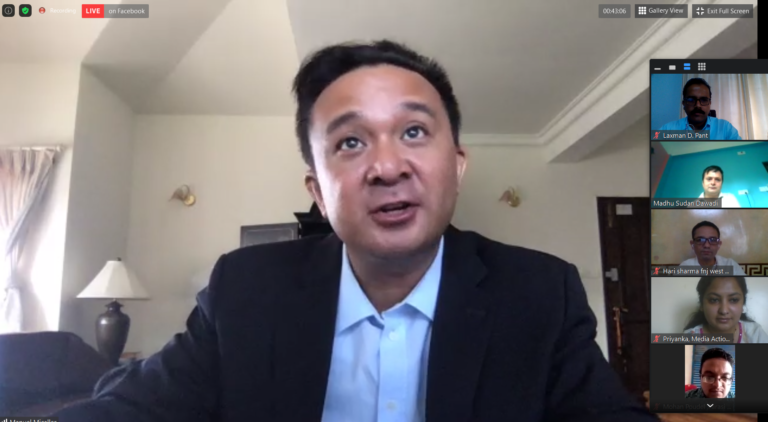KATHMANDU: At a time many media outlets across the country are criticized for disseminating distorted and half-baked news and reading materials, a three day virtual media training has kicked off today, to orient journalists on various dimensions of ethical and credible journalism.
Sixteen journalists, including five female reporters, of Nawalparasi and Nawalpur districts are participating in the training organized by Media Action Nepal, as part of the ‘curbing disinformation’ initiative of the U. S. Embassy in Nepal.
In the training programme, participants will learn various issues of journalism ranging from media credibility, disinformation, and fake news to misinformation.
Inaugurating the training, Deputy Chief of Mission of the U.S Embassy in Nepal, Manuel P Micaller, stated that managing misinformation and disinformation has a paramount importance today, especially in current media context. Once misinformation is disseminated, it is incredibly difficult to control it, hence ethical and credible journalism is important for an informed democracy, he added. Reminding that journalists’ biggest asset is the public trust, Micallerhoped that the participants would take full advantage of this training to strengthen their professional skills and help practice responsible journalism in Nepal.
Also speaking at the inaugural occasion Chairperson of Media Action Nepal LaxmanDatt Pant, the lead trainer of the training, said maintaining truth and accuracy, impartiality and inclusion is the responsibility of media and journalists. He urged the participating journalists to follow ethical standards of journalism when writing news. Information Specialist of the U.S. Embassy,PreranaMarasini, emphasized on the need for adhering to values of professional journalism and the necessity of combating misinformation and disinformation.

Also a trainer, Prof. Dr. MofizurRahman from the Dhaka University, highlighted how fake news is multidisciplinary in nature. He listed out characteristics of fake news and provided the trainees with vivid examples of incidents of fake news in the near past. He also highlighted ways of detecting fake news, namely experts’ verification, speaker profiles, linguistic cues, etc and provided the participants with links to websites that help with fact-checking and verification.
Also facilitating a session on standards of ethical and credible journalism, Pant provided the participants with examples of standards in preventing fake news from a research book published recently by Media Action Nepal.